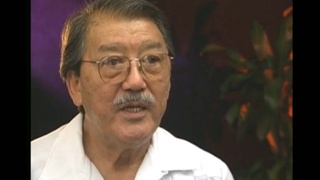Interviews
442nd’s contribution to redress
We succeeded to the extent that if it wasn’t for the 442nd there’d have been no redress. Redress was not a judicial issue no matter what anybody says. It would have never got to the Supreme Court, it a never been overruled. Maybe it should have gone back, but that isn’t in the works and isn’t the books and that isn’t the way the judicial system works. According to the judicial system, you’d have to have a similar case brought up all over again to go through the courts, and there’s not going to be another similar case. So it becomes a political issue.
And if it’s a political issue passed by Congress, then how much blood you shed and things like that count. If it wasn’t for the record of the 100th, 442nd, do you think Congress would have ever passed that? Nah. You’d have never won it on a pure logic, judicial reasoning, see. All the hard-liners would have held fast, but they can’t fight the losing of blood. And even the hard-liners when you get down to it, they say yeah, you’d be willing to Europe and fight and shed blood, but you wouldn’t fight the Japanese, see. But when you tell them about the MIS, then they have to give in, see. So yes, I say the contributions of the veterans from World War II has helped, but it hasn’t solved the problem.
Date: August 28, 1995
Location: California, US
Contributed by: Watase Media Arts Center, Japanese American National Museum
Explore More Videos


Duties of the Witness Chair
Chaired the Chicago JACL's Redress Committee.








Figuring out a dollar amount for redress
Judge, only Japanese American to serve on CWRIC.

Deciding to serve on the CWRIC
Judge, only Japanese American to serve on CWRIC.

On hearing of CWRIC selection from Senator Inouye
Judge, only Japanese American to serve on CWRIC.

Personal feelings as a Nikkei commissioner
Judge, only Japanese American to serve on CWRIC.

A memorable CWRIC testimony of an unjust situation
Judge, only Japanese American to serve on CWRIC.

Understanding the passion behind the people giving testimonies
Judge, only Japanese American to serve on CWRIC.
